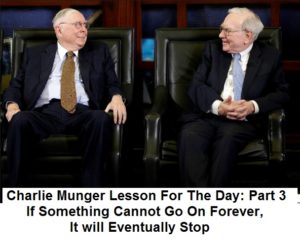 Excellent Book: Charlie Munger For All Seasons
Excellent Book: Charlie Munger For All Seasons
he rise and ebb of civilizations is as sure sunrise and sunset. No civilization holds the totem pole position forever. Greece, Rome, China, Great Britain et. al. all had experienced its own rise and decline.
At corporate levels, they remind us of Jack Welch’s strategy of requiring each department head to name his own replacement. For his own replacement at General Electric, the corporation narrowed down the CEO selection to three candidates and in the end Jeff Immelt was chosen to lead General Electric.
In government, the political successions that are non-events are invariably well planned and involved a lot of hard work.
At a personal level, we all too have to pass the baton at some point. In one of the greatest commencement speech ever (Stanford University, 2005), Steve Jobs narrated: “About a year ago I was diagnosed with cancer. I had a scan at 7:30 in the morning, and it clearly showed a tumor on my pancreas. I didn’t even know what a pancreas was. The doctors told me this was almost certainly a type of cancer that is incurable, and that I should expect to live no longer than three to six months. My doctor advised me to go home and get my affairs in order, which is doctor’s code for prepare to die. It means to try to tell your kids everything you thought you’d have the next 10 years to tell them in just a few months. It means to make sure everything is buttoned up so that it will be as easy as possible for your family. It means to say your goodbyes.”
Even the mighty and much admired Steve Job had to pass the baton. However, the doctor’s advice to “get your affairs in order” is worthy advice. If you have to leave, why leave behind a mess for your loved ones?
What has Charlie Munger to say on this?
1. In the end, I’m speaking toward the only outcome feasible for old Valiant-for-Truth in Pilgrim’s Progress: “My Sword I to him who can wield it.”
2. Well, Einstein is easy because Einstein is famous for saying, “Everything should be made as simple as possible, but no more simple.” Now, the saying is a tautology, but it’s very useful, and some economist – it may have been Herb Stein – had a similar tautological saying that I dearly love: “If a thing can’t go on forever, it will eventually stop.”
3. On China’s rise: The best answer I ever got on that subject – in three tries – was from George Shultz. He said, “Charlie, the way I figure it is if we stop trading with China, the other advanced nations will do it anyway, and we wouldn’t stop the ascent of China compared to us, and we’d lose the Ricardo-diagnosed advantages of trade.” Which is obviously correct.